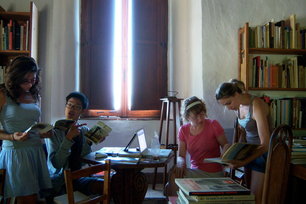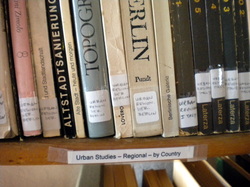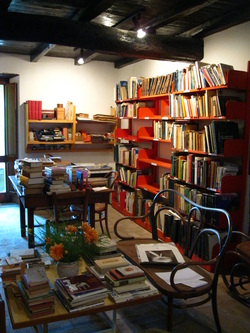Northwest Institute for Architecture and Urban Studies in Italy (NIAUSI) internship

Deliverables: various (see below).
Primary skills developed: Project management, people management, long-distance communication, independent decision-making, assessment, time management
--
Description & Significance:
This scope of this internship, originally a one-month library organization project based in Italy during the summer of 2010, has expanded, and I am excited to be back again this summer as a consultant on various other media at the site.
During the summer of 2010, I took on the task of organizing and entering metadata for roughly 2,500 books in a private collection in Italy, with the help of 3 interns. The time constraints and my own limited cataloging experience at the time made it a great training ground for prioritization of tasks, assessment and development of project planning, and shaping a library for the needs of anticipated users. Specifically, after assessing various organization platforms and the collection itself, its purpose and scope, I developed my own somewhat ad-hoc classification scheme, as well as a protocol for metadata and arrangement. This brought up questions and conundrums it would have been impossible to anticipate outside the framework of an applied set of tasks.
I feel especially fortunate to have been invited back to revisit some of the work I did last summer—in particular, integrating an item-level indication of classification to improve accessibility and use of the library (i.e., adding labels to the books), and expanding the scope to include recommendations for organization and storage of collections of various media. Because the overall institutional archiving project is still just getting started, I am gaining a very broad view of how to build this understanding, and where to start in building a small private library from scratch. Being the resident ‘expert’ has been very challenging and forced me to seek guidance in some instances, and learn when to make decisions based on the information and experiences I already have in others.
This opportunity has thus far been one of the most valuable and extended occasions I have had to put various aspects of my library education into practice, and has brought together many of the skills I learned in various classes. I am looking forward to further developing the management and project organization skills it has allowed me to begin practicing, and perhaps to continue working with this collection in the future. In addition to giving me a chance to work beyond my comfort zone professionally, it has also enabled me to continue adding to my life goal of international travel, which I see as another aspect of my intended professional and personal education. Cultural variations inform professional approaches as well, and I believe that cultural heritage practices in the United States and abroad have the potential to inform one another in mutually beneficial ways, broadening how each group sees itself and its profession.
(Please also see my home page for links to more project reflections and experiences.)
Primary skills developed: Project management, people management, long-distance communication, independent decision-making, assessment, time management
--
Description & Significance:
This scope of this internship, originally a one-month library organization project based in Italy during the summer of 2010, has expanded, and I am excited to be back again this summer as a consultant on various other media at the site.
During the summer of 2010, I took on the task of organizing and entering metadata for roughly 2,500 books in a private collection in Italy, with the help of 3 interns. The time constraints and my own limited cataloging experience at the time made it a great training ground for prioritization of tasks, assessment and development of project planning, and shaping a library for the needs of anticipated users. Specifically, after assessing various organization platforms and the collection itself, its purpose and scope, I developed my own somewhat ad-hoc classification scheme, as well as a protocol for metadata and arrangement. This brought up questions and conundrums it would have been impossible to anticipate outside the framework of an applied set of tasks.
I feel especially fortunate to have been invited back to revisit some of the work I did last summer—in particular, integrating an item-level indication of classification to improve accessibility and use of the library (i.e., adding labels to the books), and expanding the scope to include recommendations for organization and storage of collections of various media. Because the overall institutional archiving project is still just getting started, I am gaining a very broad view of how to build this understanding, and where to start in building a small private library from scratch. Being the resident ‘expert’ has been very challenging and forced me to seek guidance in some instances, and learn when to make decisions based on the information and experiences I already have in others.
This opportunity has thus far been one of the most valuable and extended occasions I have had to put various aspects of my library education into practice, and has brought together many of the skills I learned in various classes. I am looking forward to further developing the management and project organization skills it has allowed me to begin practicing, and perhaps to continue working with this collection in the future. In addition to giving me a chance to work beyond my comfort zone professionally, it has also enabled me to continue adding to my life goal of international travel, which I see as another aspect of my intended professional and personal education. Cultural variations inform professional approaches as well, and I believe that cultural heritage practices in the United States and abroad have the potential to inform one another in mutually beneficial ways, broadening how each group sees itself and its profession.
(Please also see my home page for links to more project reflections and experiences.)
Deliverables 2011

Deliverables & Artifacts 2010

Final Recommendations
Library Arrangement Guide
Library User Manual (compiled/designed by Jonathan Teng)
NIAUSI Newsletter
Library Arrangement Guide
Library User Manual (compiled/designed by Jonathan Teng)
NIAUSI Newsletter
